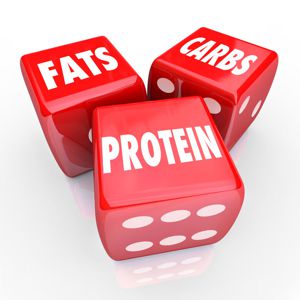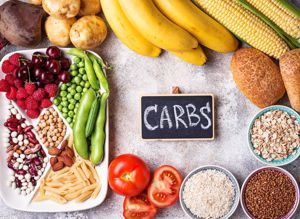
Exercise, Diet and Sleep: Achieving Peak Performance, Part 1 of 2

Everyone who is just starting out on their journey of getting fit focuses almost exclusively on the exercise part of the plan, but there are two other aspects that are just as important: diet and sleep. These three are like the legs of a tripod. Take one of them away and the tripod topples.
It’s about more than just exercise. Without proper diet and rest your body won’t respond to training, no matter how hard you work out.
I’ve now written many posts about exercise, and if you’re looking for tips, from beginner to advanced, then I invite you to browse the past posts, especially A Simple Effective Training Program for Newbies and An Advanced Training Program for Building Mass and Strength. Today, we’re going to focus on the first of the other two legs of the tripod and look at the science behind why diet matters just as much as exercise. Next week, we’ll make a similar exploration of the effects of sleep upon the body.
The Question I Get at Least Once a Week
I get asked a lot how to get in shape. I understand that what most people mean by this question is, “How do I lose weight?” The answer I give them usually gets me a shocked looked, because it immediately makes it clear that eating healthy is far more complex than they thought. This is, word for word, what I say to them, “You’re eating the wrong foods, in the wrong quantities, at the wrong time of day”.
“What? It’s really that complex?”
Yes, it is. It’s not just about reducing caloric intake or making better food choices. Our body is a complicated machine. A simple steam turbine with only a handful of moving parts will run just fine on kerosene or any of a number of other slow burning fuels, but put that same kerosene in your very complicated, electronically controlled, fuel injected car and it won’t run (plus you’ll likely ruin your engine trying). It’s simply the wrong kind of fuel.
Our bodies require the right fuel at the right time to run with peak efficiency. This is why competitive athletes obsess about their pre-competition diets and meals. They’ve learned the hard way that the wrong fuel at the wrong time will have a very significant negative impact on their performance. But even if you’re not an athlete, what you eat, how much, and when will significantly impact your energy levels, moods, mental acuity, immune system, body composition and more.
The Right Mix of Fuels
So what’s the right mix? Foods come in three categories that we all recognize: carbs, proteins and fats (We won’t address alcohol, which is in a category of its own. We know it’s not healthy and it’s a very poor energy source). You may have seen the simple formula of 60/20/20. This means a diet that’s 60% carbs, 20% fats, and 20% proteins. Unfortunately, this is plain wrong on a number of different levels.

“Percentages are meaningless, because it is the absolute amount of carbohydrate and protein that matters,” says Asker Jeukendrup, Ph.D., an exercise physiologist at the University of Birmingham in England and one of the world’s leading experts on the effects of different amounts of carbohydrate and protein intake on endurance performance. “How much you need depends on your goals and the amount of training you do.”
Percentages are meaningless. You need to calculate the absolute requirement for your body based upon activity level and body composition.
I would add to Dr. Jeukendrup’s statement. Your current body composition also matters. If you’re carrying an extra 10 kilos of fat you need to shed, the ratio of carbs/proteins/fats will be different than what you’ll need after you lose that fat.
So, how do we figure it out? Fortunately, there are formulas that are accurate, but you’re going to have to do a little math.
Calculating Carb Intake

Dr. Jeukendrup recommends “from 5 to 10 grams per kilogram of body weight per day with training ranging from one hour per day to five hours or more”. You need more carbs the more active you are, so for most of us the lower end of this formula will work. For myself, when I’m working to shed fat, I adjust the carb intake even lower and replace those calories with lean proteins and some healthy fats. I also avoid simple carbs as much as humanly possible. This means no sugars or processed grains (bread, crackers, cake, etc).
Most of us think of bread, pasta and desserts when we think of carbs, but there are plenty of healthy carbs found in foods such as fruits, vegetables, nuts, legumes, seeds and whole grains such as oats and barley. Carbs have three components; fiber, starch and sugar. Sugar is a simple carb, while fiber and starch are complex carbs. For the most part, complex carbs are good, while simple carbs should be avoided.
So, follow Dr. Jeukendrup’s formula and make sure the carbs you ingest are healthy, complex carbs and you’re on the right track.
Calculating Protein Intake
For decades now, bodybuilders have followed the formula of 2.2 grams of protein per day per kilo of body weight, and higher if they are ‘cutting’ or shedding fat for a competition. Dr. Jeukendrup agrees that this is a good rule of thumb although he found in his studies that for very competitive athletes who are training hard (he studied cyclists), up to 3 grams per kilo per day was even more beneficial and resulted in improvements to performance.
Calculating Fat Intake
This is the easy one. There are fats, and mostly healthy ones, in protein foods such as meat, eggs and nuts as well as some fats in complex carb foods as well. If you follow Dr. Jeukendrup’s formulas for carbs and proteins, and make healthy food choices, your body will be getting enough healthy fats without needing to do any math.
Next week, we’ll look at sleep and the profound impact it has on our physical and mental health, as well as upon our fitness goals.
This article is an exploration of the science behind how our body uses different fuels. Qualified professionals are being quoted on the specifics of food intake. As always, consult your doctor or other qualified professional before making any major changes to your diet.
Will Dove
Latest posts by Will Dove (see all)
- Body Weight Training 2.0: Calisthenics - 22 Apr
- All About Protein Powders - 9 Apr
- Top 5 Fitness Trends for 2019 That You Should Try - 30 Mar
